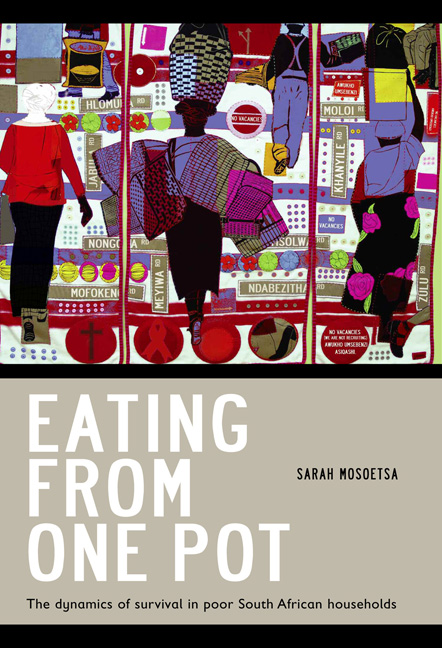Book contents
- Frontmatter
- Contents
- Foreword
- Acknowledgements
- Introduction
- Chapter 1 ‘Sharing the little I have with my family’: the allocative rules of household resources and income
- Chapter 2 ‘My wife does not respect me anymore’: unequal power dynamics in households
- Chapter 3 ‘I remain an ANC member, but …’: civil society in Mpumalanga and Enhlalakahle
- Chapter 4 Theoretical and Policy Implications
- Conclusion: Poor households are fragile sites of stability
- Selected Bibliography
- Index
- Frontmatter
- Contents
- Foreword
- Acknowledgements
- Introduction
- Chapter 1 ‘Sharing the little I have with my family’: the allocative rules of household resources and income
- Chapter 2 ‘My wife does not respect me anymore’: unequal power dynamics in households
- Chapter 3 ‘I remain an ANC member, but …’: civil society in Mpumalanga and Enhlalakahle
- Chapter 4 Theoretical and Policy Implications
- Conclusion: Poor households are fragile sites of stability
- Selected Bibliography
- Index
Summary
Poverty is an ever-present reality in contemporary South Africa. The distribution of wealth in the country is heavily skewed towards the rich. Despite a radical increase in social welfare over the last decade and a half, the vast majority of households remain poverty-stricken. While the poor are heavily reliant on the state for income in the form of social grants, the majority of people are not eligible for them. This means that the meagre income derived from grants has to support many people besides their intended beneficiaries. A quarter of South Africans are jobless in terms of the official definition of unemployment. When the entire economically active population is taken into account, however, the figure rises to a staggering 32 per cent. Unemployment is likely to get even worse as wage employment declines further. Given this grim picture, the burning question becomes: ‘How do the poor survive?’ This book provides an answer on the basis of evidence from case studies of households in the townships of Enhlalakahle and Mpumalanga in KwaZulu-Natal. It shows that many households are on the brink of collapse. That they keep going at all can largely be attributed to the struggles of older women against poverty. They are the fulcrum on which household survival turns.
Poor households are sites of both stability and conflict. In the absence of waged employment, working class households are the only source of security for many of the poor. People can still call on an ethos of sharing and communal support. In the words of one of the people who was interviewed for this book: ‘We eat from one pot and should always help each other.’ A recurring refrain in the interviews was: ‘I have to share the little I have with my family.’ Despite the sentiments expressed in this sort of statement, however, it is clear that practices of solidarity and sharing are being steadily eroded by adverse social and economic conditions. Social relations are frequently inharmonious and resources are not always equally shared. In fact, the case studies that are explored in this book suggest that in times of crisis there is more conflict than cooperation in the poorest households, a finding which accords with Amartya Sen's (1990) notion of co-operative conflict.
- Type
- Chapter
- Information
- Eating from One PotThe dynamics of survival in poor South African households, pp. 1 - 22Publisher: Wits University PressPrint publication year: 2011



